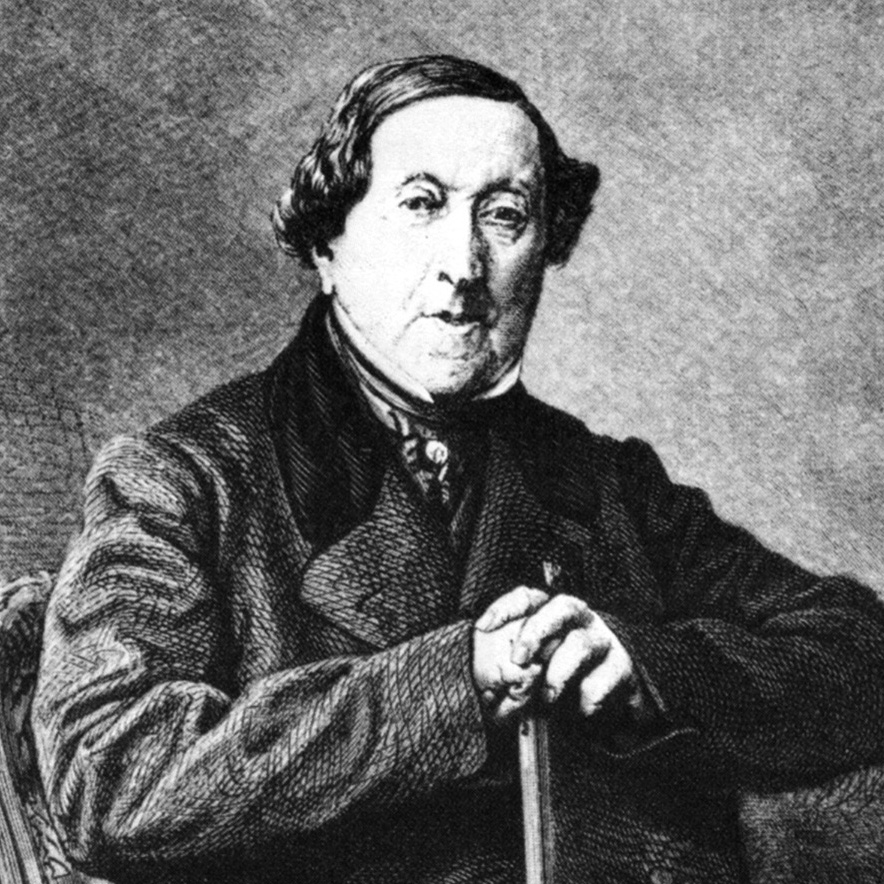
Rossini
Born: 1792
Died: 1868
Gioachino Rossini
By the time he had left the Liceo Musicale in Bologna he had composed a large amount of music, including five string quartets. He wrote his first opera, Demetrio e Polibio, in 1808 and this led to his first commission – La cambiale di matrimonio, a one-act opera which in turn prompted further commissions. From here Rossini’s career snowballed rapidly. His first full-length opera, Tancredi, was an enormous success (the aria ‘Di tanti palpiti’ was the equivalent of one of today’s pop hits) and less than three months later he had an even greater triumph with his comic opera L’italiana in Algeri. By 21 he was famous throughout Italy.
Venice had been the stage for his early work. Rossini then moved on to Naples and temporarily to Rome, where he’d been asked to write an opera for the Teatro Argentina. Desperate for a story, he decided to use Beaumarchais’s play Le barbier de Séville. It was an audacious choice for any composer but Rossini composed the 600 pages of his The Barber of Seville in 13 days (according to Rossini – his biographer says 19). Though he borrowed from some of his previous work, it remains one of the most astonishing feats of sustained, instant musical creation. The premiere was a fiasco but the second performance was a triumph and Il barbiere di Siviglia has continued to delight audiences throughout the world on a regular basis ever since.
Based in Naples, Rossini began an affair with the prima donna Isabella Colbran and continued his triumphant progress with La Cenerentola (1817), Mosè in Egitto (1818), La gazza ladra (1817) and Zelmira (1822). In fact, between 1808 and 1829 he produced no fewer than 40 operas. Now married to Colbran, Rossini moved to Vienna, where he met Beethoven and composed Semiramide (1823), his next big hit. Then on to London, where he was feted by public and royalty alike (George IV sang duets with him) and treated as the greatest living composer. In 1824 he headed for Paris, where he adapted his style to French tastes with Le comte Ory (1828), following it with his grand opera masterpiece, William Tell. That was in 1829.
Rossini was by now immensely wealthy and at the height of his creative powers. Then his life took a completely unexpected course. He simply stopped composing. Except for his Stabat mater and Petite Messe solennelle of 1863, he wrote nothing else of importance. No one has yet come up with a completely convincing explanation why he made this decision – lack of inspiration? Worn out? His neurasthenia? Inability to find good singers? Afraid of competition? It could be none or any of these reasons.
In 1832 Rossini met Olympe Pélissier, a celebrated Parisian beauty, who became his mistress. They left Paris for Bologna in 1836 and, when Isabella Colbran died in 1845, the two were married. From 1848 to 1855 they lived in Florence and then returned to Paris. Like many Italians, Rossini was extremely superstitious and was terrified of Friday 13th. He died on November 13, 1868 – a Friday. There were 6000 mourners in his funeral procession, four military bands and a chorus of 399 which sang the Prayer from his Mosè in Egitto. His estate, when he died, was valued at about one million pounds.

Gramophone Digital Club
- Digital Edition
- Digital Archive
- Reviews Database
- Full website access
From £8.75 / month
Subscribe
Gramophone Full Club
- Print Edition
- Digital Edition
- Digital Archive
- Reviews Database
- Full website access
From £11.00 / month
Subscribe
If you are a library, university or other organisation that would be interested in an institutional subscription to Gramophone please click here for further information.





